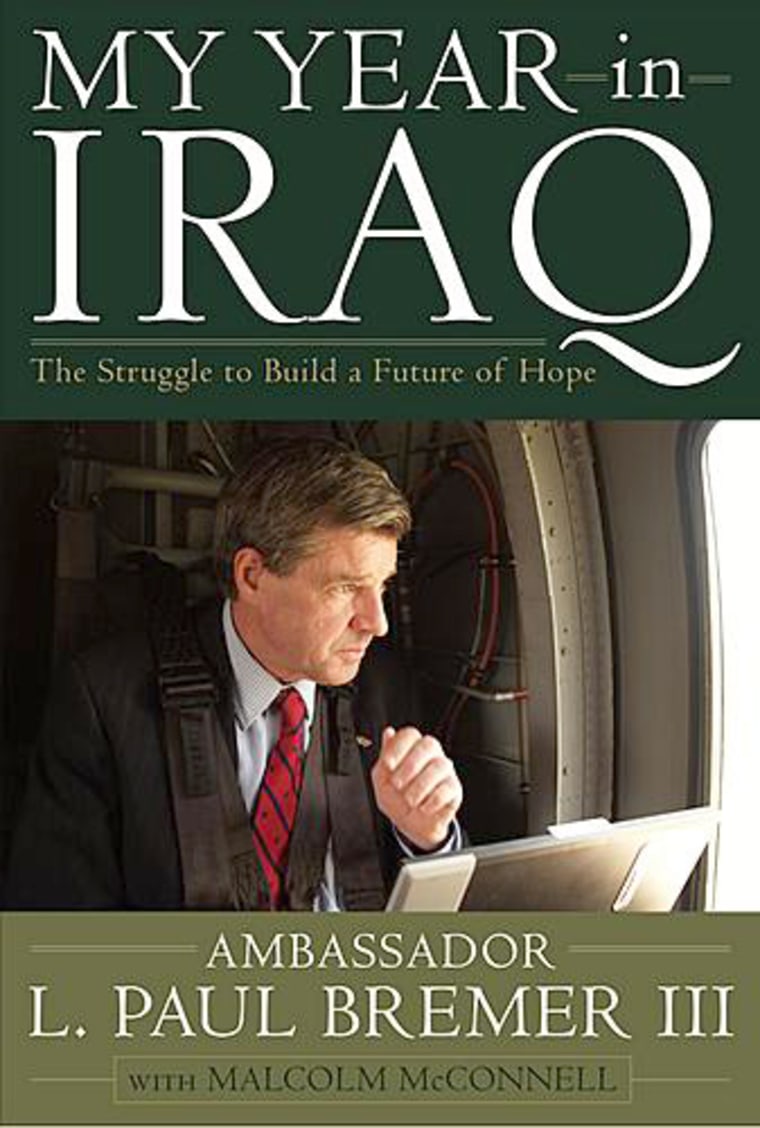Ambassador L. Paul Bremer became a special envoy and Administrator of the Coalition Provisional Authority, the temporary government ruling Iraq after the fall of Baghdad, in May 2003. Now, almost three years later, Bremer talks about how the government handled the war in Iraq while he was there in a revealing new book, "My Year In Iraq: The Struggle to Build a Future of Hope." Read an excerpt, below.
Tour of Baghdad Children’s Hospital
I had braced myself to see sick children, but nothing could have prepared me for the rows of cribs and battered incubators. Because the hospital generator ran only at night, and then only periodically to save fuel, the air-conditioning plant was not working. The air was oppressive and stale. Flies swarmed through the open windows and clumped on the chipped metal bars of the cribs. Distressed mothers, half-shrouded in black abaya robes, waved cloths or squares of cardboard to keep the flies from their children’s faces.
In the neonatal ward, I bent to read the stainless-steel model tag on an incubator. It had been built in “West Germany” in 1962, forty years before. The tiny baby inside wore a ragged cloth diaper. I touched the chipped glass. Fierce sunlight from the open windows provided the only warmth. The nurses shifted the powerless incubators from sunlight to shade, improvising to maintain an even temperature.
In the next ward, we stopped at the crib of a shriveled infant, so small I was sure she was a preemie. No shrouded woman fanned the air at her bed.
“Why don’t you put her in an incubator?” I asked the attending pediatrician, a tall young man with stooped shoulders and a two-day growth of beard.
“Because she is not one of the premature,” the doctor said. He glanced at the child’s chart. “Little Khadija is actually . . . seven months old. She is just badly undernourished.”
I studied the feeding tube in her crusted nostril. The child stared back at me with unblinking liquid eyes. I had to look away. Was she a war orphan or a victim of Baathist repression and mismanagement? It didn’t matter. Like millions of other Iraqis, she needed help. Seeing this suffering baby, it hit me like a thunderclap: I was responsible for her, and for thousands like her. Having authority as administrator meant nothing if I couldn’t bring some improvement in the lives of ordinary Iraqis. Before it was too late.
The Rosetta Stone of the insurgency
…At my morning intelligence briefing, Bill[CIA Station Chief] and an astute Arabic-speaking Army captain named Julia Nesheiwat had shown me a water-spotted Mukhabarat document in Arabic—replete with stamps and signatures—and a verbatim English translation.
“It’s dated 23 January 2003, Mr. Ambassador,” Julia had explained. “One of our teams found it in a ransacked Iraqi intelligence office.”
“Both the MI analysts, and the station people consider it authentic, sir,” Bill had added, referring to Military Intelligence. “It’s their equivalent of Top Secret/Sensitive.”
The document was addressed, “To All Offices and Sections.” To cover “an emergency” (the Coalition invasion of Iraq), the Mukhabarat listed orders for a point-by-point strategy to be implemented after the probable collapse of the regime. Beginning with the order, “Burn this office.”
I read the translation. It did indeed call for a strategy of organized resistance, which included the classic pattern of forming cells and training combatants in insurgency. “Operatives” were to engage in “sabotage and looting.” Random sniper attacks and ambushes were to be organized.
The order continued, “. . . scatter agents to every town. Destroy electric power stations and water conduits. Infiltrate the mosques, the Shiite holy places . . .” The document also ordered Mukhabarat agents to arm themselves and conduct assassinations.
… Tired as I was, I didn’t fall asleep easily that night. There was a significant firefight up the river. But it wasn’t the pounding of the weapons or the coffee I’d drunk that kept me awake. The Arabic words “To All Offices and Sections” floated in my mind. Saddam’s security apparatus had contained a lot of offices and sections.
“Double Date” with the Bushes
There was one pleasant interlude during that stressful week: On Wednesday, September 24, President and Laura Bush invited Francie and me to join them for a private dinner at the White House. Once again, the president took care to ensure that the dinner was known in Washington circles. The Washington Post referred to this as our “double date.”
Francie and I went up the elevator in the East Wing to the family’s private quarters, and when the elevator door slid open, the Bushes were there with hands extended.
The president was informally dressed in slacks and a dark blue sport shirt; Mrs. Bush was a little more formal in a suit and high heels. They were relaxed and soon so were we. One immediate bond was the Bushes’ pets, Spot the Brittany spaniel; Barney, the black Scottie; and the even blacker cat, India. The pets milled underfoot with charming ill discipline, which gave the residence the feel of a well-loved family home.
The president drew me over to a yellow couch at the end of the room and we talked intently about Iraq as Francie and Mrs. Bush discussed books. At least I supposed that’s what they were talking about because both are passionate readers, and, it turns out, both read in bed. I learned that the president and I end our days with almost identical words: “Please! Put your book down and turn out the damn light.”
From MY YEAR IN IRAQ by Ambassador L. Paul Bremer III with Malcolm McConnell. Copyright © 2006 by L. Paul Bremer III. Reprinted by permission of Simon & Schuster, Inc.
